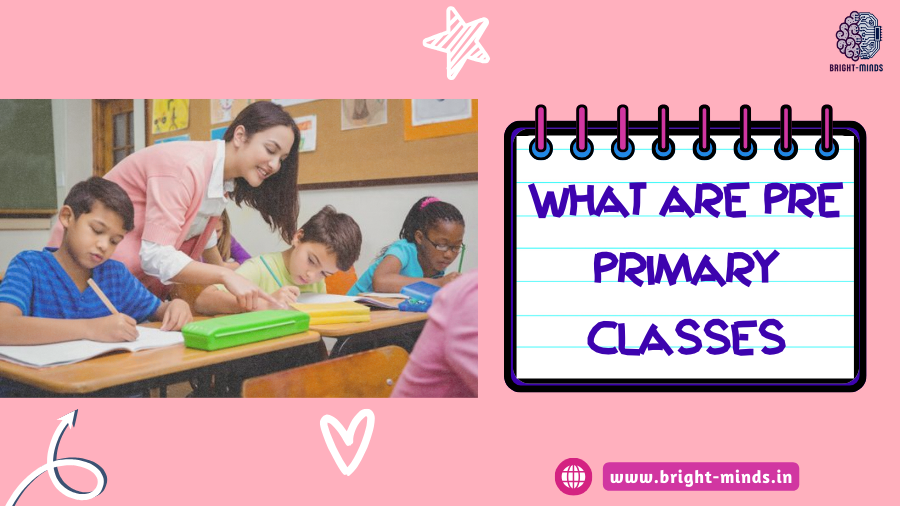Discover what Pre Primary Classes entail and their importance for early childhood education. Learn about curriculum, activities, and developmental benefits
The early years of a child’s life are crucial for their development. This is when they begin to explore the world around them, develop foundational skills, and build a love for learning. Pre-primary classes play a vital role in nurturing these young minds during this critical period.
What are Pre-Primary Classes?
Pre-primary classes, also known as early childhood education or preschool education, are designed for young children before they enter formal schooling. These classes are crucial for laying the foundation for future learning and development. In this blog, we will explore what pre-primary classes entail, their importance, typical curriculum, and the benefits they offer to young learners.
Pre-primary classes cater to children typically between the ages of 3 to 6 years, depending on the educational system and country. These classes provide a structured environment where children engage in various activities that promote their cognitive, social, emotional, and physical development.
What Happens in Pre-Primary Classes?
Pre-primary classes are designed to be much more than just daycare. While they may offer childcare services, their primary focus is on fostering a child’s development in various domains:
- Social and Emotional Development: Pre-primary classes create opportunities for children to interact with their peers, learn to share, take turns, and express their emotions in healthy ways. These social interactions play a vital role in building self-confidence and social skills.
- Cognitive Development: Through play-based learning activities, children are introduced to basic concepts like numbers, letters, shapes, and colors. They also learn to solve simple problems, think creatively, and develop critical thinking skills.
- Physical Development: Pre-primary programs incorporate activities that promote gross motor skills (large muscle movements) and fine motor skills (small muscle movements). These activities may include singing, dancing, playing with blocks, finger painting, and outdoor play.
- Language Development: Pre-primary classes provide a rich environment for language acquisition. Children are exposed to new vocabulary, learn to communicate effectively, and develop a love for storytelling and books.
Benefits of Pre-Primary Classes
There are numerous benefits associated with enrolling your child in pre-primary classes. These include:
- Improved Social Skills: Pre Primary Classes offer a safe and supportive environment for children to interact with their peers and develop essential social skills like cooperation, communication, and conflict resolution.
- Enhanced Learning: Play-based learning activities stimulate a child’s curiosity and natural desire to explore. This fosters a love for learning that can set the stage for academic success in later years.
- School Readiness: Pre Primary Classes help children develop the skills and confidence they need to make a smooth transition to kindergarten. This includes learning classroom routines, following directions, and focusing on tasks.
- Emotional Development: Pre Primary Classes programs provide a nurturing environment that helps children develop a sense of self-worth, build emotional regulation skills, and learn to navigate their emotions in a healthy way.
- Cognitive Growth: Through play and exploration, children develop foundational cognitive skills such as problem-solving, critical thinking, and creativity.
- Fine and Gross Motor Skill Development: Pre-primary programs incorporate activities that help children develop both gross motor skills (jumping, running) and fine motor skills (writing, manipulating objects).
Choosing the Right Pre-Primary Class
With a variety of pre-primary programs available, choosing the right one for your child can feel overwhelming. Here are some factors to consider:
- Curriculum: Look for a program that aligns with your parenting philosophy and educational goals for your child. Many programs offer play-based learning, Montessori, Waldorf, or Reggio Emilia approaches.
- Class Size and Student-Teacher Ratio: Smaller class sizes and lower student-teacher ratios allow for more individualized attention and a more nurturing environment for young children.
- Facility and Safety: Ensure the pre-primary program has a clean, safe, and stimulating environment that caters to the needs of young children.
- Location and Schedule: Consider the location and schedule of the program to ensure it aligns with your needs and your child’s routine.
Conclusion
Pre Primary Classes offer a valuable opportunity for young children to develop their social, emotional, cognitive, and physical skills. By providing a nurturing and stimulating environment, these programs prepare children for academic success and a lifelong love of learning. If you’re considering enrolling your child in a pre-primary class, do your research and choose a program that aligns with your family’s values and your child’s individual needs.pen_sparkcircle
you may be interested in this blog here:-
Phonics Worksheets for Kindergarten PDF Fun Literacy Stations!

